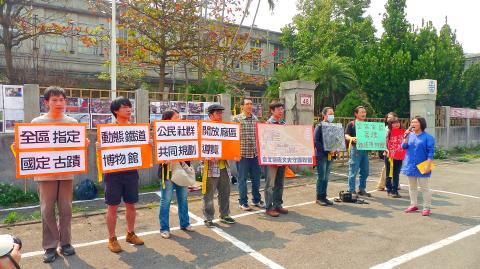The Ministry of Culture yesterday announced its decision to designate the Taipei Railway Workshop as a national cultural heritage site, marking a long-awaited victory for cultural preservation groups.
The decision signaled an abrupt halt to earlier development plans proposed by former Taipei mayor Hau Lung-bin’s (郝龍斌) administration, which originally allocated 57 percent of the 17-hectare site for commercial use.
Cultural Heritage Bureau director-general Shy Gwo-lung (施國隆) yesterday said that the compound would be preserved in its entirety, while the historic workshop itself would be renovated to house a railway museum.

Photo: Yu Pei-ju, Taipei Times
Constructed in the 1930s during Japanese colonial rule, the Taipei Railway Workshop was known as the “hospital” for the nation’s trains, and considered the most important railway maintenance depot in Taiwan.
The compound features a diverse range of architecture, including an engine room and a Japanese-style bath house, as well as lush vegetation.
Announced in September last year, original plans for the site provoked a prolonged campaign spearheaded by cultural preservation groups and railway enthusiasts, who said that the compound should be preserved in its entirety to preserve knowledge of the maintenance process.
Although several buildings within the compound were designated as historical monuments through successive campaigns in 2000, 2012 and 2013, the compound as a whole lacked adequate protection, the activists said.
“The importance of the Taipei Railway Workshop lies not only in its architecture, but also in its role as an assembly line for industrial production and its role within the context of an industrial landscape,” activist Huang Li-ping (黃立品) said.
Proposed commercial uses for the compound also stoked anger among nearby residents, who said that local infrastructure would be inadequate to accommodate a massive influx of tourists and shoppers to the area following the construction of the Songshan Cultural Park and the Farglory Dome project nearby.
Earlier yesterday morning, members of the Taipei Railway Workshop Heritage Conservation Union congregated outside the site, demanding that authorities help to protect the compound and increase public participation in future plans.
In a symbolic gesture to offer their blessing to the beleaguered site, dozens of activists and their supporters tied yellow ribbons to the fences that surround the compound.
Meanwhile, the Taiwan Railways Administration (TRA), which would prefer to develop the site to fulfill its needs, was not happy about the decision.
TRA Deputy Director-General Chung Ching-da (鐘清達) said that the Cultural Heritage Preservation Act (文化資產保存法) holds the owner of the property responsible for managing and maintaining a historical site, adding that the managing and maintenance of a historical site was not the railway operator’s forte.
Nor did the administration have the manpower and funding to preserve the historical site, he said.
“They only know how to give birth to the child, but they are not raising it themselves,” he said of the activists, adding that different agencies should share the burden of preserving the historical site in a more reasonable and responsible manner.
Additional reporting by CNA

Alain Robert, known as the "French Spider-Man," praised Alex Honnold as exceptionally well-prepared after the US climber completed a free solo ascent of Taipei 101 yesterday. Robert said Honnold's ascent of the 508m-tall skyscraper in just more than one-and-a-half hours without using safety ropes or equipment was a remarkable achievement. "This is my life," he said in an interview conducted in French, adding that he liked the feeling of being "on the edge of danger." The 63-year-old Frenchman climbed Taipei 101 using ropes in December 2004, taking about four hours to reach the top. On a one-to-10 scale of difficulty, Robert said Taipei 101

A preclearance service to facilitate entry for people traveling to select airports in Japan would be available from Thursday next week to Feb. 25 at Taiwan Taoyuan International Airport, Taoyuan International Airport Corp (TIAC) said on Tuesday. The service was first made available to Taiwanese travelers throughout the winter vacation of 2024 and during the Lunar New Year holiday. In addition to flights to the Japanese cities of Hakodate, Asahikawa, Akita, Sendai, Niigata, Okayama, Takamatsu, Kumamoto and Kagoshima, the service would be available to travelers to Kobe and Oita. The service can be accessed by passengers of 15 flight routes operated by

Taiwanese and US defense groups are collaborating to introduce deployable, semi-autonomous manufacturing systems for drones and components in a boost to the nation’s supply chain resilience. Taiwan’s G-Tech Optroelectronics Corp subsidiary GTOC and the US’ Aerkomm Inc on Friday announced an agreement with fellow US-based Firestorm Lab to adopt the latter’s xCell, a technology featuring 3D printers fitted in 6.1m container units. The systems enable aerial platforms and parts to be produced in high volumes from dispersed nodes capable of rapid redeployment, to minimize the risk of enemy strikes and to meet field requirements, they said. Firestorm chief technology officer Ian Muceus said

MORE FALL: An investigation into one of Xi’s key cronies, part of a broader ‘anti-corruption’ drive, indicates that he might have a deep distrust in the military, an expert said China’s latest military purge underscores systemic risks in its shift from collective leadership to sole rule under Chinese President Xi Jinping (習近平), and could disrupt its chain of command and military capabilities, a national security official said yesterday. If decisionmaking within the Chinese Communist Party has become “irrational” under one-man rule, the Taiwan Strait and the regional situation must be approached with extreme caution, given unforeseen risks, they added. The anonymous official made the remarks as China’s Central Military Commission Vice Chairman Zhang Youxia (張又俠) and Joint Staff Department Chief of Staff Liu Zhenli (劉振立) were reportedly being investigated for suspected “serious